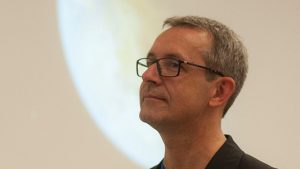Professor René Doyon receives the 2020 Dunlap Award from the Canadian Astronomical Society (CASCA)

The Center for Research in Astrophysics of Quebec (CRAQ) congratulates René Doyon of the Université de Montréal, member of the CRAQ and director of the Observatoire du Mont-Mégantic (OMM) and the Institute for Research on Exoplanets (iREx), who received the 2020 Dunlap Award for Innovation in Astronomical Research Tools from CASCA.
Dr. Doyon obtained his PhD from Imperial College London. He is currently a Professor of Physics at the University of Montreal, the Director of the Institut de recherche sur les exoplanètes, and the Director of the Observatoire du Mont-Mégantic. Among his many honours and awards are the 2009 NSERC John C. Polanyi Award, the 2009 CASCA Peter G. Martin Prize, the 2010 AAAS Newcomb Cleveland Prize, the 2011 Medal of Honour of the National Assembly of Quebec, and a 2018 Killam Research Fellowship. Dr. Doyon has a long track record of providing both the Canadian and the international astronomical communities with access to first-class research tools. These include instruments on the Canada-France-Hawaii Telescope (SPectropolarimètre InfraROUge, SPIRou; Wide-field InfraRed Camera, WIRCam; Kilo-InfraRed imager, KIR), in Chile (Near-Infrared Planet Searcher, NIRPS, on the La Silla 3.6m; Gemini Planet Imager, GPI, on the Gemini 8m; Caméra PAnoramique Proche-InfraRouge, CPAPIR, on the CTIO 1.5m), and at the Observatoire du Mont Mégantic (MONtreal Infrared CAmera, MONICA; CPAPIR; Spectrographe Imageur de MONtreal, SIMON). Dr. Doyon also leads the flagship Canadian contribution to the James Webb Space Telescope, the Near-Infrared Imager and Slitless Spectrograph (NIRISS)
About the Dunlap Award
The Dunlap Award was established in 2013 thanks to a generous gift from the Dunlap Institute for Astronomy & Astrophysics, University of Toronto. The award is presented in even-numbered years, to an individual or team for the design, invention, or improvement of instrumentation or software that has enabled significant advances in astronomy.
Source:
Robert Lamontagne
Public outreach
Center for Research in Astrophysics of Quebec
Phone: (438) 495-3482
lamont@astro.umontreal.ca
